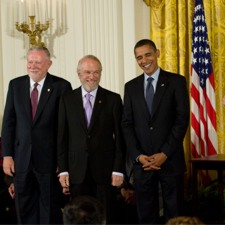| John Warnock - Father of PostScript |
Page 3 of 3
This promo video, Adobe Postscript: The Language of Business from 1991 gives an insight in how Adobe's co-founders felt the role of PostScript was to aid effective communication using an the electronic analog to paper. In it Geschke states: The purpose of trying to combine type and graphics and photographs all together is a recognition of the fact that for literally hundreds of years people have felt that it was the effective way to communicate - it's not just words, it's not just drawings, it's not just pictures, it's the combination of all of that that make communication more effective on the printed page - and now on displays and television screen as well. Warnock adds: We went to recreate that electronic form of paper. In other words we want the electronic analog to paper. Paper has been a very effective invention of mankind and the display of information on that media has been enormously effective and what the computer needs to do is help that process.
Later Career and AwardsHaving been first President and then CEO of Adobe for 2 years and 16 years respectively, Warnock retired from that role in 2000 and from the role of CTO in 2001. He served as chairman of the board from April 1989 to January 2017, sharing that position with Geschke from September 1997 until 2017 when Geschke retired. Warnock was still a member of Adobe’s Board of Directors when he died on August 19, 2023 at the age of 82. During his lifetime John Warnock was the recipient of numerous scientific and technical awards, starting with the Software Systems Award from the Association for Computing Machinery (ACM) which was presented jointly to him and Charles Geschke in 1989. Ten years later both were inducted as Fellows of the ACM. Both of them were made Fellows of the Computer History Museum in 2002 for their: "accomplishments in the commercialization of desktop publishing and for innovations in scalable type, computer graphics and printing." and in 2006 they received the American Electronics Association's Annual Medal of Achievement Award, being the first software executives to receive this award. In 2008, Warnock and Geschke received the Computer Entrepreneur Award from the IEEE Computer Society: "for inventing PostScript and PDF and helping to launch the desktop publishing revolution and change the way people engage with information and entertainment". A similar and extended citation was used when they were among the laureates of the 2008 The National Medal of Technology and Innovation, the nation’s highest honor for technological achievement, which is bestowed by the president of the United States on America's leading innovators: For their pioneering technological contributions that were central to spurring the desktop publishing revolution and for their role in changing the way people create and engage with information and entertainment across multiple mediums including print, video, and the Web.
In 2010, Warnock and Geschke received the Marconi Prize, considered the highest honor specifically for contributions to information science and communications. Recognition from the University of Utah was shown in three different ways. In 1995 he received the university's Distinguished Alumnus Award. It conferred an honary degree on him and, after a giftof 200,000 shared of Adobe Systems, named a new engineering building completed in 2007, the John E. and Marva M. Warnock Engineering Building. Warnock was also a member of the United States' National Academy of Engineering, the American Academy of Arts and Sciences, and the American Philosophical Society, America's oldest learned society. John E Warnock More Information
To be informed about new articles on I Programmer, sign up for our weekly newsletter, subscribe to the RSS feed and follow us on Twitter, Facebook or Linkedin.
|
|||||||
| Last Updated ( Monday, 21 August 2023 ) |


